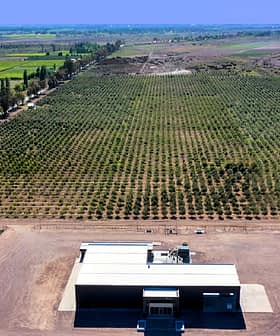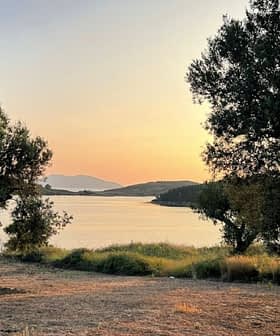In Montenegro, Producers Join in World Competition Bid
Working together, Montenegrin producers hope to replicate neighboring Croatia’s success at the World Olive Oil Competition.
 A sign in Budva, Montenegro points to an ancient olive tree thought to be among the oldest in Europe.
A sign in Budva, Montenegro points to an ancient olive tree thought to be among the oldest in Europe. Producers in Montenegro are working together to send the country’s highest-quality extra virgin olive oils to the 2022 NYIOOC Word Olive Oil Competition.
The Bar Olive Association has spearheaded the effort by helping producers conduct chemical and organoleptic analyses of the potential entrants and gather the fees to enter the competition.
We work on improving quality because, as small producers, we can’t have large-scale production, and we can’t compete with countries that do. But we can compete with their quality.
According to NYIOOC data, the only time a Montenegrin has entered the world’s largest olive oil quality competition was in 2014, but the sole producer failed to win an award.
Data from the International Olive Council show that the small mountainous republic in the southwest Balkans produces about 500 tons of olive oil per year.
See Also:Officials Hope Winning Results Spur Olive Production in HerzegovinaĆazim Alković, the president of the Bar Olive Growers Association, told a local television program, TV Budva, that he originally planned to send Montenegrin oils to New York in 2021 but could not due to the Covid-19 pandemic.
“We have been planning this some time now as our neighbors from Croatia are doing it successfully,” he said.
Alković believes that Montenegrin olive oils are just as good as their Croatian counterparts. In his opinion, the two are simply separated by the high level of support and coordination that Croatian producers’ groups provide to olive growers to enter the competition.
“So our organization made an effort to get olive growers from Bar and all other Montenegrin olive growers interested,” he said. “We decided to interest the mayors of the municipalities because paying the $400 registration fee is a problem for olive growers. Even though they have top-quality oil, they can’t afford to pay it.”
Alković further pointed out the difference in the number of Croatian entrants and winners after Dalmatian producers cooperated in sending their oils to New York last year.
From 2018 to 2020, Croatians earned between 40 and 50 awards from 45 to 60 entries at the NYIOOC. However, in 2021, they earned a record-high 87 awards from 105 entries, the fourth-highest tally from any country at the competition. Of the 87 awards, 53 came from Dalmatia.
“That’s a big success for such a small country,” Alković said. “So we hope to take that path to at least get a little closer.”
Alković is confident that Montenegrin producers can succeed at this year’s competition.
Despite having a harvest that he described as “nothing special,” the hot and dry summer prevented olive fruit fly infestations in many of the groves. The dry heat also provided the perfect amount of stress for the trees. Alković believes that quality is very high as a result of both factors.
He is also hopeful that an extra virgin olive oil produced from Montenegro’s Old Olive Tree, which some claim is the oldest in Europe at 2,245 years old, will be among the winners.
Alković argued that this type of recognition would validate the country’s ancient olive oil tradition and spur the development of oleotourism in Montenegro.
According to the European Bank for Reconstruction and Development, tourism accounts for one-fifth of the country’s annual GDP, creating slightly more than €970 million of value.
“This is not only about olive oil, but it’s also a very important tourism topic because when we have oils that win medals at world competitions, that will certainly contribute to our tourism,” he said. ”It will be only a plus.”
While establishing more oleotourism destinations in Montenegro will help local producers diversify their income, Alković said the first step is promoting high-quality production.
“We work on improving quality because, as small producers, we can’t have large-scale production, and we can’t compete with countries that do,” he said. “But we can compete with their quality, and we expect that medals from the competition will help us improve quality.”
Alković believes that Montenegro needs a national olive growers’ association instead of various local ones to achieve this goal.
“We need to create a national association to connect all associations in one,” he said. “It would be a good strategy for olive growing development in Montenegro.”
“We work in the field individually, but we must have a strategy and work together,” Alković concluded. “To join forces for success.”
Nedjeljko Jusup contributed to this report.








